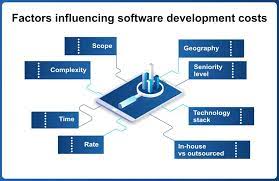Empowering Your Business: The Role of a Custom Software Development Agency
The Importance of Choosing a Custom Software Development Agency
In today’s digital age, businesses are constantly seeking ways to stay ahead of the competition and streamline their operations. One effective way to achieve this is through custom software development. A custom software development agency plays a crucial role in helping businesses create tailored solutions that meet their specific needs and requirements.
Here are some key reasons why choosing a custom software development agency is essential for your business:
Tailored Solutions
Off-the-shelf software may not always fully align with your business processes and goals. By working with a custom software development agency, you can have software solutions designed and developed specifically for your business, ensuring optimal performance and efficiency.
Scalability and Flexibility
Custom software can be easily scaled up or down based on your business growth and changing needs. A custom software development agency can create flexible solutions that adapt to your evolving requirements, providing long-term value for your investment.
Competitive Advantage
Custom software gives you a competitive edge by offering unique features and functionalities that differentiate your business from competitors. With tailor-made solutions, you can enhance productivity, improve customer experience, and drive innovation within your organization.
Enhanced Security
Off-the-shelf software may pose security risks due to its widespread use and known vulnerabilities. Custom software development agencies prioritize security measures during the development process, ensuring that your data remains protected against potential cyber threats.
Ongoing Support and Maintenance
A reputable custom software development agency provides continuous support and maintenance services to ensure the smooth operation of your software applications. This proactive approach helps prevent downtime, resolve issues promptly, and keep your systems up-to-date.
In conclusion, partnering with a custom software development agency offers numerous benefits for businesses looking to optimize their operations, improve efficiency, and achieve strategic goals. By investing in customized solutions tailored to your unique requirements, you pave the way for sustainable growth and success in today’s competitive market.
Top 8 Frequently Asked Questions About Custom Software Development Agencies
- How much does custom software development cost per hour?
- How much does it cost to develop custom software?
- What is CSD in software development?
- What is custom software development company?
- What is a custom software development company?
- What is the average cost of custom software development?
- What does a software development agency do?
- How do I start a custom software development company?
How much does custom software development cost per hour?
One frequently asked question regarding custom software development agencies is, “How much does custom software development cost per hour?” The cost of custom software development per hour can vary significantly depending on various factors such as the complexity of the project, the expertise of the developers, the technology stack used, and the location of the development team. It is essential for businesses to understand that while hourly rates may provide a general idea of costs, a more accurate estimate can be provided by custom software development agencies after assessing specific project requirements and scope. By collaborating closely with a reputable agency and discussing project details in depth, businesses can receive a tailored cost estimate that aligns with their budget and goals.
How much does it cost to develop custom software?
When it comes to custom software development, the cost can vary significantly depending on various factors such as the complexity of the project, desired features, technology stack, development time, and ongoing maintenance. Custom software development agencies typically provide tailored pricing based on a thorough assessment of the client’s requirements. It is crucial to consider that investing in custom software is a long-term strategic decision that can yield substantial returns on investment by enhancing operational efficiency, improving customer satisfaction, and driving business growth. The cost of developing custom software is an investment in innovation and competitiveness that can deliver significant value to businesses in the long run.
What is CSD in software development?
Custom Software Development (CSD) in software development refers to the process of creating bespoke software solutions tailored to meet the specific needs and requirements of a business or organization. Unlike off-the-shelf software, which offers generic functionalities for a broad audience, CSD focuses on developing customized applications that address unique challenges and objectives. By leveraging CSD services from a reputable software development agency, businesses can benefit from highly personalized solutions that enhance efficiency, productivity, and overall operational performance. The emphasis on customization in CSD ensures that the resulting software aligns closely with the client’s business processes and goals, ultimately driving innovation and competitive advantage in today’s dynamic market landscape.
What is custom software development company?
A custom software development company is a specialized firm that offers tailored solutions to businesses seeking unique software applications designed to meet their specific needs. Unlike off-the-shelf software, custom software development companies create bespoke solutions from scratch, considering the client’s requirements, processes, and objectives. These companies employ skilled developers, designers, and project managers who collaborate closely with clients to deliver customized software that enhances operational efficiency, boosts productivity, and provides a competitive advantage. By partnering with a custom software development company, businesses can access expertise in creating personalized solutions that align perfectly with their strategic goals and promote innovation within their organization.
What is a custom software development company?
A custom software development company is a specialized firm that creates tailored software solutions to meet the unique needs and requirements of businesses or individuals. Unlike off-the-shelf software products that offer generic functionalities, a custom software development company designs and builds applications from scratch, ensuring that the final product aligns precisely with the client’s specifications. These companies employ skilled developers, designers, and project managers who collaborate closely with clients to understand their goals and deliver customized software that enhances efficiency, productivity, and competitiveness. By partnering with a custom software development company, clients can access personalized solutions that address their specific challenges and drive innovation within their organizations.
What is the average cost of custom software development?
When considering the average cost of custom software development, it’s important to understand that pricing can vary significantly based on various factors such as project complexity, scope, features, technologies used, and the reputation of the custom software development agency. Typically, custom software development projects are priced based on an hourly rate or a fixed project cost. It’s advisable for businesses to discuss their specific requirements with a reputable custom software development agency to receive a detailed quote tailored to their needs. Investing in custom software development can yield long-term benefits by providing tailored solutions that enhance operational efficiency and drive business growth.
What does a software development agency do?
A software development agency specializes in creating customized software solutions tailored to meet the specific needs and requirements of businesses or individuals. These agencies typically offer a range of services, including software design, development, testing, and implementation. They work closely with clients to understand their objectives, challenges, and desired outcomes in order to develop high-quality software applications that address these needs effectively. By leveraging their expertise in programming languages, technologies, and industry best practices, software development agencies help clients optimize their processes, enhance productivity, and achieve their strategic goals through innovative software solutions.
How do I start a custom software development company?
Starting a custom software development company requires careful planning and strategic decision-making. To begin, you need to define your target market, identify your unique value proposition, and establish a solid business plan outlining your services, pricing strategy, and marketing approach. It is essential to assemble a skilled team of developers and designers who can deliver high-quality custom solutions to clients. Building a strong online presence through a professional website and active social media channels can help attract potential customers. Additionally, networking with industry professionals and attending relevant events can provide valuable connections and opportunities for growth. By focusing on innovation, quality, and customer satisfaction, you can lay the foundation for a successful custom software development company.





